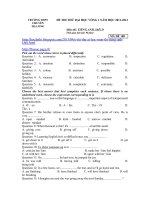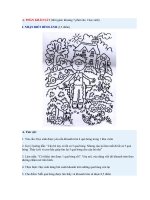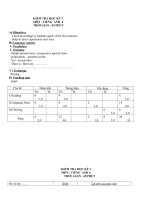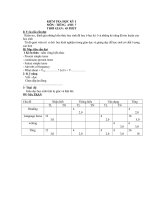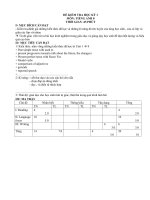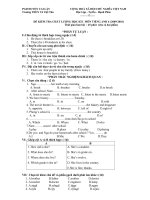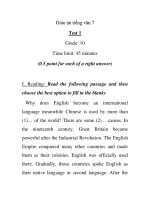Đề thi tiếng anh đề MOCK TEST 1
Bạn đang xem bản rút gọn của tài liệu. Xem và tải ngay bản đầy đủ của tài liệu tại đây (122.92 KB, 31 trang )
MOCK TEST 1 2016
Read the following passage and mark the letter A, B, C, or D to indicate the correct answer to each of the
questions.
The Alaska pipeline starts at the frozen edge of the Arctic Ocean. It stretches southward across the largest and
northernmost state in the United States, ending at a remote ice-free seaport village nearly 800 miles from
where it begins. It is massive in size and extremely complicated to operate.
The steel pipe crosses windswept plains and endless miles of delicate tundra that tops the frozen ground. It
weaves through crooked canyons, climbs sheer mountains, plunges over rocky crags, makes its way through
thick forests, and passes over or under hundreds of rivers and streams. The pipe is 4 feet in diameter, and up to 2
million barrels (or 84 million gallons) of crude oil can be pumped through it daily.
Resting on H-shaped steel racks called "bents," long sections of the pipeline follow a zigzag course high above
the frozen earth. Other long sections drop out of sight beneath spongy or rocky ground and return to the surface
later on. The pattern of the pipeline's up-and-down route is determined by the often harsh demands of the arctic
and subarctic climate, the tortuous lay of the land, and the varied compositions of soil, rock, or permafrost
(permanently frozen ground). A little more than half of the pipeline is elevated above the ground. The remainder
is buried anywhere from 3 to 12 feet, depending largely upon the type of terrain and the properties of the soil.
One of the largest in the world, the pipeline cost approximately $8 billion and is by far the biggest and most
expensive construction project ever undertaken by private industry. In fact, no single business could raise that
much money, so eight major oil companies formed a consortium in order to share the costs. Each company
controlled oil rights to particular shares of land in the oil fields and paid into the pipeline-construction fund
according to the size of its holdings. Today, despite enormous problems of climate, supply shortages, equipment
breakdowns, labor disagreements, treacherous terrain, a certain amount of mismanagement, and even theft, the
Alaska pipeline has been completed and is operating.
1.The passage primarily discusses the pipeline's ________.
A: employees
B: operating costs
C: consumers
D: construction
2.The word "it" in bold refers to ________.
A: state
B: pipeline
C: village
D: ocean
3.According to the passage, 84 million gallons of oil can travel through the pipeline each ________.
A: year
B: week
C: day
D: month
4.The phrase "Resting on" in bold is closest in meaning to ________.
1
A: Consisting of
B: Supported by
C: Passing under
D: Protected with
5.The author mentions all of the following as important in determining the pipeline's route EXCEPT the
________.
A: local vegetation
B: climate
C: kind of soil and rock
D: lay of the land itself
6.The word "undertaken" in bold is closest in meaning to ________.
A: selected
B: transported
C: attempted
D: removed
7.How many companies shared the costs of constructing the pipeline?
A: Four
B: Twelve
C: Eight
D: Three
8.The word "particular" in bold is closest in meaning to ________.
A: specific
B: exceptional
C: peculiar
D: equal
9.Which of the following determined what percentage of the construction costs each member of the
consortium would pay?
A: How many people worked for each company.
B: How long each company had owned land in the oil fields.
C: How much oil field land each company owned.
D: How many oil wells were located on the company's land.
10.Which word in the passage does the author provide as a term for an earth covering that always
remains frozen?
A: tundra
B: terrain
C: permafrost
D: plain
Mark the letter A, B, C, or D to indicate the correct answer to each of the following questions.
11.The house is much cheaper than we ________ at first.
2
A: had thought
B: were thinking
C: thought
D: think
12.We couldn’t buy anything because ________ of the shops were open.
A: none
B: all
C: half
D: most
13.I don’t think he was present ________ the meeting yesterday.
A: in
B: at
C: about
D: on
14.Who ________ wrote Pride and Prejudice ?
A: the English was writer who
B: was the writer English who
C: was the English writer who
D: the English writer who was
15.I am the last one ________ of the news.
3
A: informing
B: to be informed
C: inform
D: to inform
16.Not until the first land plants developed ________.
A: the land animals appeared
B: did land animals appear
C: land animals appeared
D: would land animals appear
17.For ________, it is certain that in the future some things will be very different.
A: the good or the bad
B: the better or the worse
C: better or worse
D: good or bad
18.It is necessary that every student ________ a uniform.
A: wears
B: be worn
C: has worn
D: wear
19.Do you know a nearby restaurant ________ has good food?
4
A: that
B: whose
C: who
D: where
20.Many young people have objected to ________ marriage, which is decided by the parents of the bride
and groom.
A: shared
B: contractual
C: sacrificed
D: agreed
21.Most of us would maintain that physical ________ does not play a major part in how we react to the
people we meet.
A: attractive
B: attractiveness
C: attract
D: attractively
22.You ________ him your map. He has one of his own.
A: needn’t have lent
B: couldn’t have lent
C: mightn’t have lent
D: mustn’t have lent
5
23.I know William has been disobedient, but don’t be too ________ on him.
A: strong
B: heavy
C: strict weak
D: hard
24.The blind child ________ a great effort to learn “Braille ”.
A: got
B: make
C: created
D: made
25.You have to ________ to know how dangerous the situation is.
A: be in his shoes
B: step into his shoes
C: tie him hand and foot
D: be on his case
26."What are Harris's new friends like?" "________. "
A: We don't really know what they like. We'd better ask them next time they are here
B: They like heavy music, especially metal rock.
C: They are just fantastic, friendly and very polite
D: They are tall and in their twenties
27.They are going to make ________ excursion next month.
A: two weeks’
B: two-weeks
C: a two-week
D: two weeks a two-week's
28.Oil ________ 80 percent of the country's export.
A: composes of
B: accounts for
6
C: results in
D: consists of
29.A: "You look nervous! ________ "
B: "This thunder scares me to death."
A: Come on.
B: Why's that?
C: How are you?
D: What's wrong?
Mark the letter A, B, C, or D to indicate the word(s) OPPOSITE in meaning to the underlined word(s) in
each of the following questions.
30.There was an abrupt change in the weather.
A: sudden
B: extreme
C: gradual
D: strong
31.Ann: Mrs Vy looks as fresh as a daisy.
Brian: Yeah, everyone’s been calling her the picture of health.
A: in poor health
B: dishonest
C: extremely strong
D: fit
Read the following passage and mark the letter A, B, C, or D to indicate the correct word or phrase that
best fits each of the numbered blanks.
Is Work Bad for you?
Popular perception is that working (1) ________ are now so over-regulated the only people likely to be injured
at work are bosses, strangled by (2) ________ tape. But beware a hidden epidemic raging in British workplaces.
In this post-industrial age, when most jobs are in (3) ________ industry, information technology and the service
7
sector, we expect working life to be relatively comfortable and at the very (4) ________ safe. We don’t expect
to be maimed, laid off for life or work ourselves into the ground.
(5) ________ again. In the UK there are still 1.6 million workplace injuries every year as well as 2.2 million
cases of ill health caused by work. Some of these injuries wouldn’t have been out of place in Charles Dickens’
England. Last year 350 people died as a result of building (6) ________ accidents, a large increase on previous
years.
But some of the worst dangers are the hidden ones. 400,000 cases of asthma are caused by working conditions,
(7) ________ to high levels of dust or traffic pollution, and asbestos still kills over 4,000 people a year. There
are no (8) ________ at present requiring owners to record the (9) ________ of asbestos, meaning that builders
and firefighters have no way of anticipating the problem. However, a non-profit organization has taken up the
issue with a new database (10) ________ in conjunction with the Trades Union Congress.
32.A: conditions
B: sites
C: habits
D: plights
33A: white
B: green
C: black
D: red
34.A: heavy
B: mild
C: strong
D: light
35.A: most
B: least
C: few
8
D: furthest
36.A: Dwell
B: Comment
C: Remark
D: Think
37.A: site
B: place
C: space
D: location
38.A: expansion
B: detection
C: exposure
D: expression
39.A: prosecutions
B: principles
C: methods
D: regulations
40.A: company
9
B: attendance
C: presence
D: residence
41.A: propelled
B: terminated
C: launched
D: embarked
Mark the letter A, B, C, or D to indicate the underlined part that needs correction in each of the following
questions.
42.Draft horses are the tallest, most powerful and heavy group of horses.
43.Working all night long. Jim felt extreme hungry and just wanted to have a sandwich.
44.They had a discussion about training not only the new employees but also giving them some challenges.
45.Twenty pounds are a bit too expensive for this pair of pants because my friend bought a similar
pair for fifteen pounds last week from a shop in the corner.
46.Some studies show that young babies prefer the smell of milk to those of other liquids.
Mark the letter A, B, C, or D to indicate the word whose underlined part differs from the other three in
pronunciation in each of the following questions.
47.A: rough
B: tough
C: plough
D: enough
48.A: probably
10
B: special
C: program
D: psychology
Mark the letter A, B, C, or D to indicate the word that differs from the other three in the position of
primary stress in each of the following questions.
49.A: attendance
B: horrible
C: element
D: company
50.A: intelligent
B: impossible
C: independent
D: experience
51.A: illustrate
B: cigarette
C: disappoint
D: understand
Mark the letter A, B, C, or D to indicate the word(s) CLOSEST in meaning to the underlined word(s) in
each of the following questions.
52.It will take more or less a month to prepare for the wedding.
11
A: approximately
B: more than
C: generally
D: simply
53.This is the instance where big, obvious non-verbal signals are appropriate.
A: situation
B: example place
C: attention
D: phenomenon matter
54.Although Valentine’s Day has become a global industry with more than 80 million roses sold
worldwide, the origins of the day are unclear and hidden in the mists of time.
A: a long time ago forever
B: magical mysterious
C: unforgettable
D: too old for anyone to confirm
Read the following passage and mark the letter A, B, C, or D to indicate the correct answer to each of the
questions.
Music is a very important part of our lives. Music is for dancing, drinking, eating, loving and thinking. Some
songs remind us of our childhood or youth. Others remind us of the people we love. Many important occasions,
like weddings and funerals have special music. Every nation has a national song like the American “The Star –
Spangled Banner”. In the U.S. , high schools and colleges have school songs, too.
Music is a part of the history of America. It expresses the problems and feelings of its people. As the years
pass, the music grows and changes.
Modern science has also changed music. Inventions like records, radio, movies, electric instruments, tape
recorders and video have changed the way we play and listen to music. They have helped to make music an
12
important form of international communication. American music, from the earliest folk songs to modern “ pop
”, is known around the world. Music is one of America’s most important exports. It brings the people of the
world together. Even when people cannot understand the same language, they can share the same music.
Understanding American music can help you understand American people, their history and culture.
55.What is true about “The Star – Spangled Banner”?
A: It’s the U.S. national song
B: It’s one American song
C: It’s liked by every nation
D: It reminds us of people we love.
56.According to the passage, music is changed thanks to the invention of the following EXCEPT:
A: International communication
B: Videos
C: Electric instruments
D: Tape recorders
57.The word “exports” in the last paragraph is nearest in meaning to:
A: things that can be sold
B: things that can be enjoyed
C : things that can be changed
D: things that can be bought
58.What is the earliest form of music in America?
A: School music
B: Folk music
C: Pop music
D: National music
59.What can be the title for this article?
A: The future of American music
B: The development of American music
C: An introduction to American music
D: The history of American music
60.According to the passage, which of the following statement is NOT true of music of America?
A: It is known around the world.
B: It only expresses the problems of the nation.
C: It contributes to the country’s exports.
D: It has experienced changes.
61.The word “form” in the passage can be best replaced by ________.
A: path
B: mean
C: route
D: sort
62.The phrase “As the years pass” could be best replaced by which of the following?
A: For a long time
B: Nowadays
C: As time goes by
D: Because time flies
63.Which of the following have helped music become an important form of international communication?
13
A: Important occasions
B: American history
C: Modern science
D: Language
14
64.Which of the following can be inferred from the passage?
A: The more one understands American music, the deeper his knowledge of the American people is.
B: If two people share the same music, they share the same language.
C: Pop music is not as popular as folk songs in America.
D: An understanding of a nation’s music will certainly lead to a thorough understanding of that country.
Finish each of the following sentences in such a way that it means the same as the sentence printed before
it.
Question 1: “I don’t think John will come”, said Bill. Bill doubted if__________________________________.
Question 2: We started cooking for the party four hours ago.
We have_________________________________________________.
Question 3: It’s such a marvelous opportunity that we mustn’t miss it.
It’s too _______________________________________________________.
Question 4: Most of the students ignored what the teacher was saying.
Few __________________________________________________________.
Question 5: The students regretted that they had missed the lecture.
The students regretted not ________________________________________.
In about 140 words, write a paragraph about the roles of women in modern families. Write
yourparagraph on your answer sheet.
-
Traditional roles: being a wife; being a mother.
Morden roles: responsible for finance, work and share burden with husband; contribute to country’s
economy
